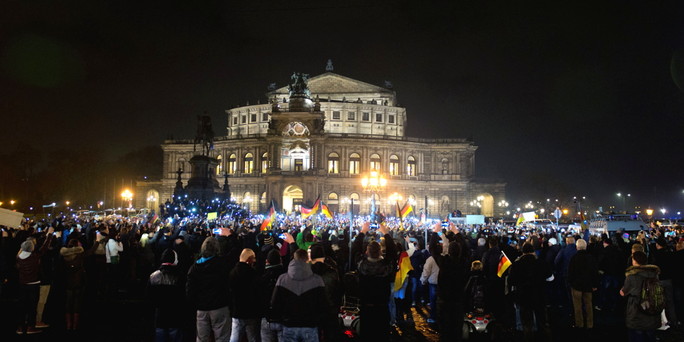Monika Cassel translates Durs Grünbein’s op-ed, which appeared on the front page of Die Zeit’s weekly magazine on February 12, 2015, the day before the 70th anniversary of Dresden’s bombing.
Every year, the city I was born in falls again. On the one hand this is a ritual (of commemoration), and on the other hand it is a reality (of history). All over the world, people know what happened to Dresden in February 1945, just before the great turning point in history when Germany was given the opportunity to better itself. The city lost nearly everything that had once made her charming and was from then on condemned to live on, severely handicapped, hideously deformed, and humiliated. Where once courtly splendor and stone-hewed bourgeois pride had delighted the eye, now desolate wastelands unfolded as I wandered through my city as a child. It is hard to imagine that this was where Casanova contracted a venereal disease and Frederick the Great, when he was still the crown prince, lost his virginity. According to legend, one of the delectable ladies-in-waiting pulled him through a concealed door and initiated him into the Saxon mysteries of love. I still remember imagining the Marquis de Sade visiting the city on the Elbe. In one thing, at least, historians are in agreement: what was supposedly once the most beautiful Italian city north of the Alps was a paradise on earth for all of the libertines of aristocratic Europe.
But it all turned out differently. Lately I have seen a monster in Dresden—it calls itself das Volk (the People) and thinks it has justice on its side. “We are the Volk,” it yells, shamelessly, and it cuts anyone off mid-sentence who dares disagree. It presumes to know who belongs and who does not. It intimidates those from foreign lands because—in the extremity of their plight—they have nowhere else to go, those who come in search of a better life. I can identify with these asylum-seekers. I was once a person who felt trapped in his country, in his native city. Who wanted to escape from a closed society—precisely the kind some wish we could return to again. Was I an economic refugee, driven by political dissent against the system that had planned my whole life for me, was it a yearning for foreign cultures, or all of these? Who can say?

